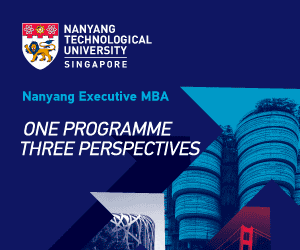Graduate Studies Blog

NANYANG EXECUTIVE MBA
Transforming Regional ESG Impact: Francois’s Journey
Amid a new global emphasis on the environmental, social and corporate governance (ESG), sustainability stands at the forefront of many corporate agendas today. However, how can global business leaders ensure that initiatives truly have a real impact?
For one sustainable aviation expert, the answer lies in high-level collaboration. “Technology per se is insufficient to drive disruption,” said Francois Balland, Chief Product Officer at AIR Lab, a joint research lab by French multinational Thales and the Civil Aviation Authority of Singapore.
“International flights frequently cross regional boundaries, and the impact of aviation emissions transcends national airspace,” he added. “We are reaching a stage, where further optimisation can only be done through regional collaboration, which requires cultural intelligence, stakeholder identification and engagement.”
Directing global teams across Asia and Europe, Balland’s work is centered on driving innovation technology through the development of next-generation, digital aviation solutions that leverage new technologies, such as Cloud and open API and involve regional experiments such as collaborative data exchange.
To facilitate the long-term stakeholder collaboration needed to turbocharge these solutions, the C-suite executive, who has spent 15 years with Thales and holds a Master of Science, enrolled in the Nanyang Executive MBA (Nanyang EMBA) programme at Nanyang Technological University (NTU) in 2022. The programme is offered by Nanyang Business School.
“As my leadership responsibilities grew, I started to feel that a consolidation of business acumen and strategic thinking skills would support me in being more impactful in the moments that matter,” he shared.
A Powerful Suite of Interconnected Skills
In the Nanyang EMBA, participants embark on study trips to partner institutes, Haas School of Business at the University of California, Berkeley, and Tsinghua University, School of Economics and Management in Beijing, where they gain insights on cultural intelligence and innovation delivered by world-class faculty.
“I chose NTU, because the inclusion of immersions in Tsinghua and Berkeley unveiled diverse perspectives on conducting business in Singapore, the United States, and China. Acquiring a comprehensive understanding of these varied approaches and incorporating them into one’s portfolio is an exceptionally potent tool.”
Through these experiences, Balland – who achieved a position on the Dean’s List for his mastery of the programme’s modules – gained “a profound appreciation for cultural nuances in communication, and a valuable repertoire of business approaches that can be leveraged to enhance executive acumen and decision-making capabilities”.
The regional leader leveraged stakeholder analysis strategies to tailor Thales’ value proposition and communication strategies to better align with stakeholder priorities and leveraged his newfound negotiation expertise to garner stronger stakeholder support for initiatives.
Beyond cultural insights, he also parlayed learnings from modules on corporate sustainability into key projects aimed at optimising regional air traffic to reduce fuel consumption, and channelled takeaways on corporate innovation into guiding project teams, partners and experts to embrace disruptive technology.
“Technology in itself holds little value unless it is embraced through relevant corporate strategy, with the right teams, stakeholders, investments, and at the right time – the point being that the value of the Nanyang EMBA programme is reinforced through the realisation of ties between each module,” he said.
“The emphasis on cultural intelligence, as well as business sustainability, helped me design solutions that considered environmental impact while engaging efficiently with regional stakeholders. It taught me to embrace disruption, which is what is needed to integrate these technologies effectively, while keeping sustainability in focus.”
Cross-Pollinating Ideas Through New Connections
Beyond lectures, Balland’s cohort of C-suite executives, partners, managing directors and business owners – hailing from 15 nationalities and across 20 industries – also proved to be a rich source of innovation around sustainability practices.
In one conversation, a peer with a background in airport operations shed light on innovative practices in terminal management and security that were useful for enhancing aviation efficiency.
Another time, discussions with fellow participants from the automotive industry on emission mitigation proffered new approaches to reducing the carbon footprint of the aviation sector.
In a third instance, classmates involved in airline maintenance shared knowledge on best practices that could reduce fuel burn and, in turn, greenhouse gas emissions.

“The interactions expanded my horizons significantly, and the network cultivated has been instrumental in creating a larger web of connections, opening doors to collaborative ventures, and providing access to valuable insights across various sectors,” said Balland, who was conferred the Outstanding Peer Award for his own contributions around cultural, technological, and industrial perspectives.
What lies ahead for this sustainability leader? Much like the technology he engages with, Balland aspires to evolve personally and promote a more sustainable direction within the current generation of corporate leadership.
“We are living in an environment where conservatism leads to missed opportunities,” he remarked. “I like to remind myself that in today’s disruptive world, it’s crucial for senior executives to remember that if we don’t fail, it means that we haven’t tried hard enough.”
“It is our turn to empower a future generation of leaders to drive change, and advocate for sustainability – leading by example to drive these important causes forward and make a meaningful impact on the issues the world is facing.”
About the Nanyang Executive MBA
In this rapidly changing world driven by technology, digitalisation, and sustainability, lifelong learning is the key to stay ahead of the competition. The Nanyang EMBA equips business leaders with the tools and strategies to lead purposefully in the hyperconnected economy.
This part-time programme offers a career-compatible schedule, which allows you to focus on both work and study. The programme’s duration is 13-months with the flexibility to stretch to 2 years to accommodate work demands.
Visit our website at https://bit.ly/NanyangExecMBA or download the brochure to learn more about the programme and available funding options.
Download the Nanyang Executive MBA brochure
Click here to learn more about the Nanyang Executive MBA programme or contact us at execmba@ntu.edu.sg.


